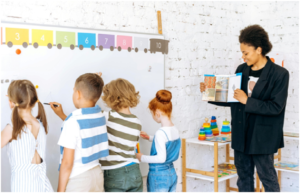How to study effectively from home?

In these times of confinement, it is important to respect the measures imposed, taking care of yourself and your loved ones while continuing to work. To do this, some advice in order to be able to optimize your working time and move forward as best as possible.
In these times of confinement, it is important to respect the measures imposed, taking care of yourself and your loved ones while continuing to work. To do this, some advice in order to be able to optimize your working time and move forward as best as possible.
Get organized to study effectively at home
In order to study effectively at home, it is important to organize your study day at your convenience and to be completely independent. We know it’s a real challenge because it takes a lot of discipline and great commitment and diligence in order to succeed. Studying from home allows you to work at your own pace and at the chosen time, some pitfalls are still to be avoided.
Here are some tips for organizing your study day with ease
To start, you need to establish a clear and well-defined work plan. Even a rough estimate of the amount of work that remains to be done should be made. Then, you have to think about organizing your study schedule based on a calendar that will allow you to better define the time slots for each theme, chapter or subject to be learned.
Such an initiative makes the organization more efficient and avoids loss of time and unproductiveness while ensuring better management of contingencies. Everything is clear with a carefully established schedule! Thanks to this method, we will gain in efficiency while being less stressed.
Plan your training programs well and maintain a certain rigor
Then, you need a total commitment to plan and above all follow your schedule to the letter, but it is also important to rest to recharge your energy. By taking breaks, you devote a little time to yourself, clear your mind and above all regenerate your resources to be able to maintain the effort over time.
It is useless to plan long and exhausting study sessions, because often they turn out to be unproductive. On the contrary, you should know that the optimal concentration time is 25 minutes several times a day, beyond this period of time, the brain stops assimilating things. It is better to take a break to get some fresh air, stretch your muscles, eat something and replenish your energy before resuming your training program.
Sometimes when it’s time to get to work, you have trouble concentrating or starting your tasks. In this case, it is advisable to undertake some relaxation exercises to put oneself in a favorable condition for learning, to fit into a posture dedicated to concentration.
However, it is not a question of devoting an hour to doing yoga, but simply of breathing, relaxing your muscles and the tensions (by letting your shoulders drop for example) that accumulate there before starting. After a few minutes of relaxation, you can start studying with more enthusiasm.
Effective lesson learning requires a structured and methodical approach. By adopting a certain order and a good rhythm, it is possible to reach the end of the lessons more quickly. It would be wise to take note of the most relevant points, this facilitates memorization and understanding. One of the methods to follow is to use summary sheets that summarize the courses and allow you to retain the essentials. It is therefore important to create your own notes and converse to re-read them regularly.
A student cannot be successful in all activities and content (some chapters will seem easier to you than others), nor consistently all the time. Learning is not a linear process. Rather, it is an approach that slowly matures with sudden flashes of understanding that allow significant advances in the mastery of the skills sought.
That’s why we encourage you to ask for help when you’re having trouble with a particular lesson. Above all, don’t stay stuck on one point for too long. Ask your trainers questions remotely.
Flee distractions to succeed in correspondence courses
Studying at home presents many potential distractions. Computer, telephone, television, books, cooking, cleaning… When you don’t really want to study, all excuses are allowed!The good reflex is therefore to put yourself in conditions identical to those of a classroom. We cut off the radio, TV and mobile phone and, above all, we forbid ourselves access to the Internet (except for the obligatory research, of course!).Also ask your loved ones, family and friends, to let you study in peace, without soliciting you. The idea is to build you a work environment conducive to concentration.




